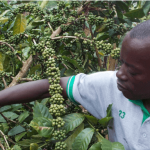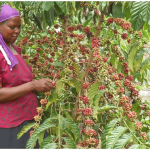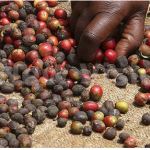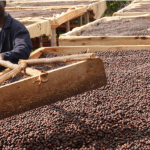“The huge untapped potential for agribusiness in Africa offers the best prospect for addressing the complex issues of unemployment, extreme poverty and food and nutrition insecurity,” explains Joseph Nkandu, managing director of the the Danida-funded UniBRAIN Consortium for enhancing University Responsiveness to Agribusiness Development Limited (CURAD), “particularly by reducing post-harvest losses and adding value to their produce.” In Uganda’s coffee value chain, CURAD is responding to this by providing agribusiness ‘incubation’, a process which nurtures young men and women entrepreneurs, helping them survive and grow during the start-up period by providing services and resources tailored to enhance their competitiveness. The process provides business development, market access and financial services, as well as mentoring and networking.
Unlocking potential
The inspiration for CURAD arose from the fact that there is sufficient land, labour and capital in Africa but agribusiness is constrained by insufficient entrepreneurial capacity. In Uganda, the rise in food consumption – driven by population growth and an expanding middle class – is creating huge agribusiness opportunities which CURAD is determined must not be lost.
Universities, research institutions and the private sector are being encouraged to work together
© NUCAFE
“Universities and research institutions around the globe are a source of innovations, technologies and processes that, once tapped and commercialized by the business community, accelerate economic development,” says Nkandu. But in many cases, universities, businesses and research institutions work in isolation from each other. To ensure that incubators foster partnerships, develop agreed upon best practices and create cultures and environments that promote innovation and entrepreneurship, UniBRAIN ensures that each incubator is owned by at least one university, a business and a research institution. In Uganda, UniBRAIN has combined the strengths of Makerere University, the National Union of Coffee Agribusinesses and Farm Enterprises (NUCAFE) Ltd, and the National Agricultural Research Organization’s (NARO) Coffee Research Institute to facilitate an innovation incubator.
The Africa Commission has observed that when university graduates do business they create more jobs than those without a university education. So CURAD’s key clients are young graduates who have business concepts that promise to be sustainable and scale-able. Selection is undertaken through a competitive process: the strength of a business plan is considered alongside the results of an entrepreneurial test, which interested entrepreneurs complete. Each entrepreneur is nurtured through mentoring and coaching programmes, provided with office space, helped to register their company, and linked to financial institutions. Joy Munge is just one ambitious young graduate who has benefited, currently being supported to develop a business plan for a sweetened instant coffee drink. As well as developing business plans, the start-ups are provided with agribusiness development services through capacity building and training.
Incubation approach

Through CURAD, NUCAFE has greatly improved the visibility of its coffee brand
© NUCAFE
Right from the outset, CURAD’s ‘Triple Helix’ (university-business-research) approach to agribusiness incubation has greatly improved the way in which the staff of Makerere University’s College of Agriculture and NARO interact with the private sector – and particularly with individual businesses, including NUCAFE. The improved inter-institutional trust has encouraged NARO to commit technologies and processes emerging from its research for commercialisation, enabling its research to have greater impact. For example, NARO has made available seven Coffee Wilt Disease-resistant varieties for commercialisation through the incubator that will improve farmers’ crop protection against the wilt disease which killed over 50 per cent of Uganda’s robusta coffee trees. The young entrepreneurs are key in facilitating innovations and technology development, and creating enterprises that ensure smallholder farmers benefit. It is estimated that through this UniBRAIN commercialisation effort, over 20,000 smallholder farmers will access clean planting materials.
At the same time, CURAD is using NUCAFE’s innovative hybrid Farmer Ownership Model, which over the last ten years has enabled smallholder farmers to assume a greater role within the value chain and increase their share of revenue generated from ‘finished’ products. Makerere University has initiated curriculum reforms with a pilot agribusiness curriculum beginning with internships for students and equipping lecturers with new or improved teaching methods. The curriculum will also include guest speakers, entrepreneurs, mentors and coaches during the delivery of the course to increase interaction of students and private business owners. This ignited excitement in entrepreneurship has resulted in an overwhelming demand for the incubator’s services. “I now see a bright future in expanding my yoghurt business to include coffee flavours,” says one incubatee, Agnes Orishaba. There are currently over 60 prospective incubatees – with 80 per cent from Makerere University and the other 20 per cent individuals from other universities and the private sector – who have registered their interest in CURAD’s comprehensive and integrated support services.
Hands-on

Graduates are receiving entrepreneurial and practical, hands-on experience
© NUCAFE
In another approach to capacity strengthening, CURAD is supporting 25 interns through its consortium member NUCAFE under an “Earn As You Learn Programme” which is helping the University develop better quality graduates with more entrepreneurial and practical hands-on experience, who are able to attract employment or start up their own businesses. Through CURAD, NUCAFE has in turn accessed a lot of partnerships and networks that have greatly improved the visibility of its coffee brand and has boosted demand. Sales of coffee have more than quadrupled.
Tapping into its widespread network of partners, CURAD is organising an international training course in general tools and concepts of agribusiness and small and medium enterprise (SME) development with the Danida Fellowship Centre (DFC) and NIRAS, an international consulting company. This will advance North-South collaboration in Africa’s growing food-agribusinesses. The course will be held from 4-15 November 2013 at CURAD’s incubation centre.
“CURAD is going to be Uganda’s Silicon Valley in the agribusiness sector in Uganda,” says Nkandu.








